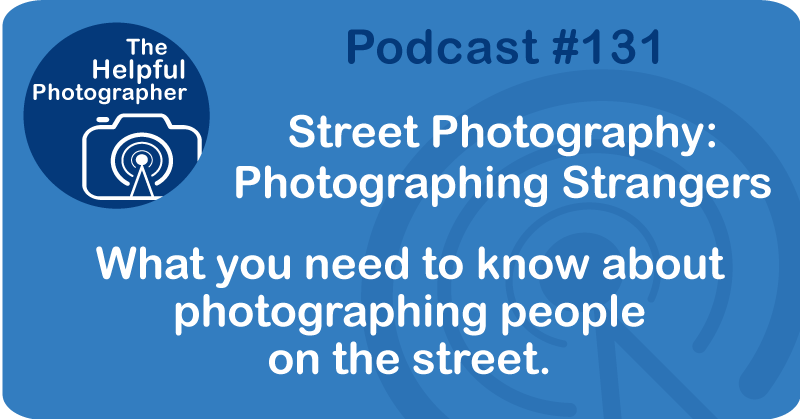Street Photography: Photographing Strangers #131
Street Photography: Photographing Strangers #131

This pod is for Tom, way out on Long Island. Tom is interested in photographing people on the street. People often ask me how I feel about photographing strangers. My answer is fine. I feel just fine about it. I've been doing it my entire career. But before I talk about the ethics, I want to talk about the legalities, which can be two different things.
First, I'm not a lawyer, and nothing I say here should be construed as legal advice. Here in the United States, there is no presumption of privacy in a public space. If you can see it, you can photograph it, provided that you're in the space legally. In other words, you are not trespassing or on private property where the property owner has the right to restrict your activity. Take the case of the photographer who went to the top of the Empire State Building to photograph a model. It wasn't just so much that he was photographing this model, he had her take her shirt off. Yep, sure did. Although in New York City it is perfectly legal for a woman to walk around in public topless, they both got arrested, and the Empire State Building sued them, because they were on private property and they broke the rules they had agreed to when they purchased the tickets to be there. So short of that, you can pretty much photograph anything you want in the United States. This includes bridges, tunnels, police stations, the police, courthouses, the military, children, and even other people's children. The problem lies in what you do with the images, which I'm not gonna get into here.
Beyond the legal question, there's also an ethics question. People ask if I feel the need to ask. I'm in the camp of ask for forgiveness and not permission. Look, what you need to know is that people are people. Put yourself in their position. How would you feel if someone just pointed their camera at you and started taking photographs? Would you be okay with this? Also, the fact is, it's how you handle the situation. If you feel like you're stealing from a person, guess what? They feel like you're stealing from them too. So don't steal. Own your position. Be friendly about it. Smile at people. It helps to break the ice if you smile. Talk to people before you shoot. Ask about the dog they're walking. Ask to photograph the dog. Stop being a creepy stranger, and be a curious human being.
But what about where you don't have a common language? This is a tougher situation, but there's no reason why you can't break that barrier either. Take a photograph of the person's surroundings and show them that picture as an icebreaker, and then you can start photographing them. Are you in a market? Buy something. Buy a few pieces of fruit. Buying a few pieces of fruit will give you tons of permission to photograph them. But then you also need to read the situation. Is the person receptive to you? If not, maybe give them some space and go photograph someone else.
So what about the legalities of photographing people outside the United States? This is extremely problematic, as every place has its own laws. For instance, in the UK, I'm told that you can't legally photograph other people's children even from behind. You'll have to do your research before you go off somewhere. But honestly, my strategy is still just to smile a lot and read the room. If someone looks at me and shows me their fist, rather than smiling back, maybe it's a bad idea to keep shooting.
Another thing you'll want to pay attention to is cultural norms. I know that some cultures are more sensitive to photography than others. But again and again, it really comes down to how you handle yourself. In other words, don't be a jerk. Be friendly and people will return the favor. I hope that was helpful. Until next time, keep on shooting.











